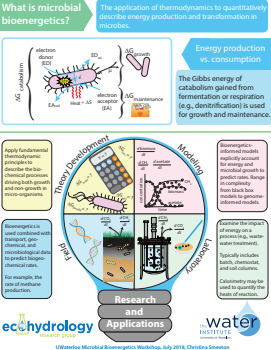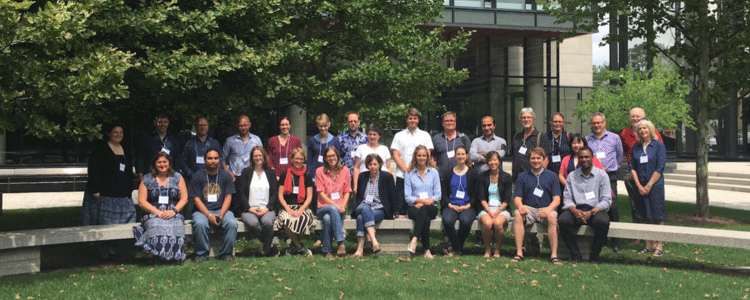A University of Waterloo Microbial Bioenergetics Workshop was held on July 23-24at the Centre for International Governance Innovation (CIGI) campus in Waterloo, organized by Water Institute member Christina Smeaton. Funded by a Water Institute Seed Grant, the two-day workshop successfully facilitated knowledge exchange and collaboration between academic researchers across disciplines and industries.
Smeaton, a research scientist from the Waterloo Ecohodrology Research Group, brought together researchers who develop microbial bioenergetics-based theory with potential end-users. The goal was to identify knowledge gaps, user needs and to facillitate collaborations. The workshop was built on the premise that applying bioenergetics should advance our ability to predict the response of microbial reaction networks to dynamic changes in physical (e.g. temperature) and geochemical (e.g. redox state, pH, substrate availability) conditions in environmental systems.
Workshop attendees included scientists from across six departments and three faculties from the University of Waterloo, as well as researchers from three other Canadian universities, four international institutions, and two industrial partners.
Microbial bioenergetics rarely applied to natural and human-modified ecosystems such as mines and oil sands

Microbial bioenergetics applies thermodynamic principles to quantitatively describe energy transformations and utilization to predict reaction rates and microbial growth. While bioenergetics is a well-established discipline in industrial environmental biotechnology (e.g. wastewater treatment), it is rarely applied to model microbially mediated processes in natural and human-modified (e.g. mines, oil sands) ecosystems. However, bioenergetics holds much promise for incorporation into predictive tools such as environmental reactive transport models (RTMs).
Workshop highlights include Bardish Chagger visit and world café

-
Day
1:
- Presentations were held on the developments and challenges in microbial bioenergetics theory, reactive transport modelling, microbial ecology, bioremediation, and emerging methods.
- Download the workshop program (PDF) for more information about the presentations.
- An interactive world café discussions centered around important research questions raised during the first day of discussions. The activity effectively identified knowledge gaps, established end-user needs, and grant opportunities moving forward.
- Waterloo MP and Leader of the Government in the House of Commons, Bardish Chagger, stopped by the workshop during the activity, showing interest in the Water Institute and the collaborative discussions and research of the participants.
- Following the workshop, attendees were invited to an excellent performance of Shakespeare’s Coriolanus in Stratford.
Modified from story originally published by Ecohydrology Research Group.